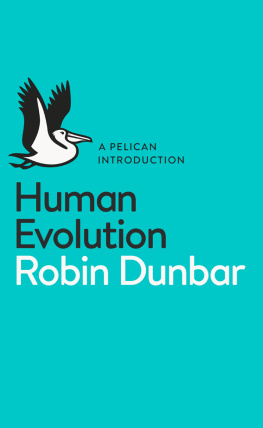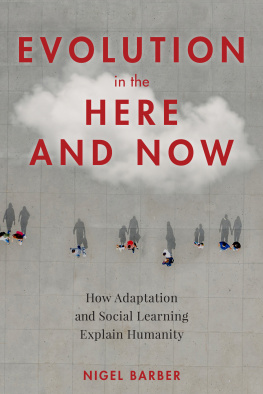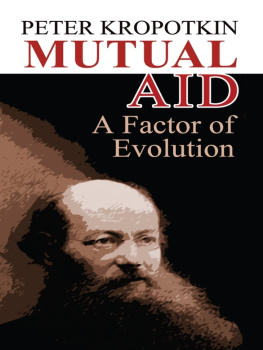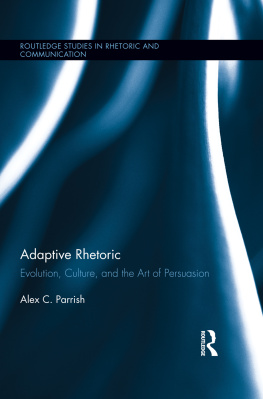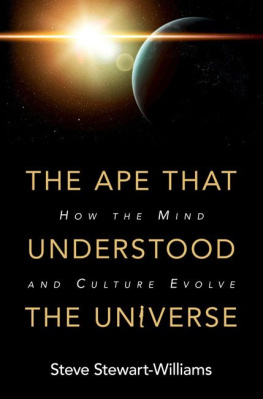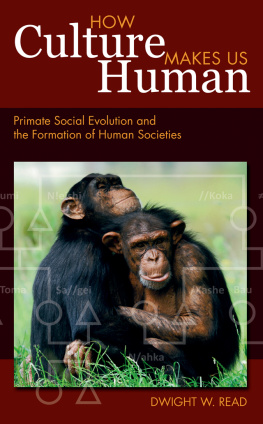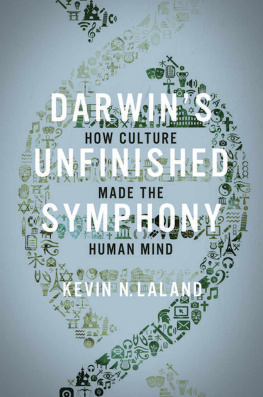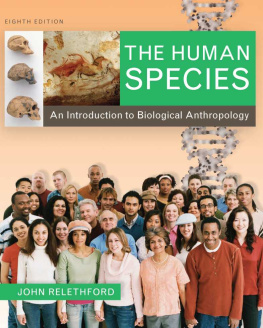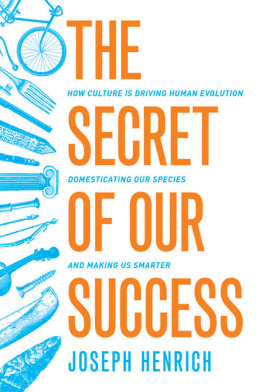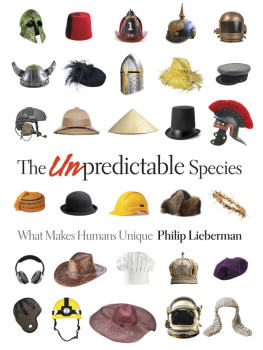ALSO BY MARK PAGEL
Evolutionary Genomics and Proteomics
with Andrew Pomiankowski (Sinauer, 2008)
The Oxford Encyclopedia of Evolution
(Oxford University Press, 2002)
The Comparative Method in Evolutionary Biology
with Paul H. Harvey (Oxford University Press, 1991)
WIRED FOR
CULTURE

Origins of the
Human Social Mind

Mark Pagel

W. W. Norton & Company NEW YORK LONDON
Contents
Preface
I BEGAN THINKING about the ideas that would lead to this book in the early 1990s while in a remote and barren region of Northern Kenya known as the Chalbi Desert. The Chalbi lies north of the town of Marsabit and to the east of Lake Turkana. Marsabit is about a days drive north from the town of Isiolo, which sits on the border of a region still called the Northern Frontier District, and that forms roughly half of Kenya. The Chalbi Desert is to some archaeologists the cradle of humanity, the place where the evolving lineage that would eventually lead to modern humans arose. It is a hot and arid region, short of water during the dry season, making it too dry for agriculture, but suited to nomadic pastoralistspeople who live by herding animals.
In the Chalbi Desert most pastoralists herd sheep, goats, and camels. A pastoralists animals are an edible bank account, with varying interest and risk rates. The sheep reproduce quickly but are finicky about what they eat. Goats will eat anything but reproduce less quickly. Camels are the gold bullion of pastoralism: they can survive the harshest conditions but are very slow about making more camels. For the nomadic pastoralists, life is like being an itinerant investment manager. Every day begins with the question of how best to divide ones resources and efforts among their four-legged investment policies: how many sheep should I have, and when I get that number should I trade them for goats and camels?
The Gabbra are a tribe of nomadic pastoralists who live in the Chalbi and descend from Cushitic people who trace their origins to the Horn of Africa. One of these Gabbra, a man called Dido, had seldom been more than about thirty miles from his birthplace, and had spent his life herding his animals and owning what he could fit on the back of a camel when it came time to shift from one area of pasture to another, something these nomads might do several times per year. In addition to his native Gabbra language, Dido could speak English from spending time among missionaries. But Dido also spoke four more languages: Rendille, Samburu, Turkana, and Swahili. I wasnt surprised about Swahili because it is a trade language spoken all over East Africa. But Rendille, Samburu, and Turkana are the languages of other nomadic pastoralists who also live near the Chalbi Desert and who make their living in the same way as the Gabbra. I asked him why he could speak their languages and he replied: So I can talk to them.
I was asking a different question. What I really wanted to know was why there were four different tribes of nomadic pastoralists all living in the same area and herding the same kinds of animals, whose genetic differences were negligible, and yet who had divided up the land and their lives so exclusively as to speak different languages. Why were there four tribes with different languages, customs, habits, and traditions, and not just one? Why do we humans have a tendency to form into small tribal groups rather than living as one large and homogeneous society? This is a worldwide phenomenon, not confined to this desert region of Northern Kenya. There are currently as many as 7,000 different languages spoken, or 7,000 mutually unintelligible systems of communication in one species, marking out at least 7,000 distinct societies. This is more different systems of communication in a single mammal speciesfor that is what we arethan there are mammal species. It is 7,000 different ways of saying, Good morning, or, Looks like rain today, and means that humans uniquely and strangely among animals often cannot communicate with other members of their own species.
For many anthropologists, culture in its wider manifestationsincluding rituals, belief systems, religion, and customssimply exists and develops its own momentum and directions in separate groups. For them, our cultural diversity arises as a consequence of geography. The wider our species spread after leaving Africa probably sometime between 60,000 to 70,000 years ago, the more different societies and languages would eventually emerge. But this fails to explain a key fact of human societies: that there are many more than we would expect from simple territorial expansion of our species, hinting at more fundamental social and psychological causes. In fact, it is where people are found most closely packed togetherthe least geographically isolatedthat we find the greatest diversity of cultures. There are regions of the northeast corner of coastal Papua New Guinea where a different language is spoken every few miles. I once met a Papuan man from that area and asked him if this could be true. He replied, Oh no, they are far closer together than that.
This cannot be a simple consequence of geography, and if we are a species with a predilection to form into societies with separate and distinct identities, then this is something that we are going to have to come to grips with in a modern world. It is also something that we will want to understand because it clashes with another feature of our species. The evolutionary biologist Robert Trivers began something of a revolution in our thinking about humans when in 1971 he put forward his idea of reciprocal altruism. It showed a way that two individuals who were not related to each other could nevertheless benefit from mutual acts of altruism. Here was a way that natural selection could escape Tennysons Nature, red in tooth and claw and promote cooperation among people who in evolutionary terms were, by instinct and temperament, competitors. By the early 1990s evolutionary biologists and anthropologists were coming to appreciate that human beings had taken this even further, having developed the means to behave altruistically toward others and even do so without any expectation of a return from those others. We are capable of great acts of charity, helping others in distress, and of simply being kind, generous, and friendly. No other animal does such things, and so it is a capability we have evolved only relatively recently. But why? So here are two observations that need to be put togetherour unmatched ability to get along with each other set against our tendencies to form competing societies often not far from conflict.
Evolutionary biologists are accustomed to recognizing that some kinds of patterns in the distribution of animals and plants and how they live reveal clues about those species tactics in surviving. It is then a matter of working backward from the patterns to discover what kinds of survival strategies would give rise to them. With humans, we want to ask what is the nature of culture as a survival strategy that it would have this feature of forming us into so many small societies, which seem to act in some respects like an extension of our bodies. We are devoted to them sometimes to the point of self-sacrifice, we cooperate with others inside of them, and we use them to advance our interests. At a psychological level, we display forms of social behavior conducive to living in small groups, such as rewarding cooperation, punishing those who deviate from norms, being wary of outsiders. What kinds of explanation can we give for these features of our lives?
Next page


